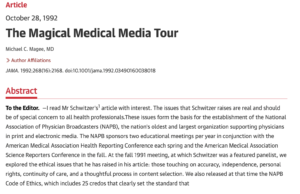The 1992 Medical Media Code of Ethics
Medical Media Code of Ethics
Blending The Ethics of Journalism and Health Care
Mike Magee MD
I. ACCURACY:
We believe our highest responsibility is to provide clear, concise, current, and accurate health information to the public in support of participatory health care.
1. Information provided should always be truthful ad well substantiated.
2. Sources of information should be fully disclosed.
3. Never extend beyond the borders of our knowledge base.
4. Areas of medical doubt or controversy should be clearly defined and communicated.
5. Where appropriate, conflicting points of view should be represented.
II. CONTINUITY:
Dedication to patient involvement in health care, a family-centered emphasis, and support of social activism based in sound public health policy are central to our mission and reflect a strong commitment to continuity of care.
1. Providing diagnosis and treatment in the absence of physical examination and consultation is to be avoided.
2. General therapeutic advice when provided to support healthy behaviors or encourage further evaluation is appropriate.
3. Thorough definition of the risks versus gains of differing modalities of care is essential.
4. Complete delineation of the possible repercussions of various approaches to care should be well defined.
5. Clear definition of the importance of face-to-face evaluations with health providers and proper follw-up should be reinforced.
III. CONTENT:
As health professionals and communicators, we accept the responsibility to distribute information that will best serve the needs of the American public.
1. Content selection should be based on its potential positive impact on health.
2. Content based on sensationalism, profit-seeking, or ratings appeal unaccompanied by redeemable positive health impact should be avoided.
3. Evaluation of the cost and quality of health care should be integral to the content development process.
4. Emphasis should be placed on educational and instructional design with clearly defined health missions.
5. Whenever possible, activities should be linked to the existing community health resources.
IV. INDEPENDENCE:
In the pursuit of accuracy and truth, we recognize the need to function in a fully credible and independent manner.
1. We affirm the constitutional right of freedom of the press and the public’s right to know.
2. Gifts or special privileges that would compromise personal independence should not be accepted.
3. Participation in organizations that would compromise personal objectivity should be avoided.
4. Editorial comments and other statements of opinion should be clearly labeled as such.
5. All sources of funding should be fully disclosed with content presentation.
V. PERSONAL RIGHTS:
We acknowledge and support the inalienable rights of people in a free society and our responsibility to support those rights.
1. We acknowledge the right of people to question and challenge actions and ideas of individuals and organizations.
2. We acknowledge the right of each individual to privacy, dignity and confidentiality.
3. We acknowledge that people and institutions are innocent until proven guilty.
4. We acknowledge a special responsibility to protect our personal patients from any practice that might be viewed as exploitive.
5. We acknowledge the right of our audience, as extensions of our own patients, to a standard of interaction that is respectful, courteous and consistent with the teachings of our health professions.
_______________________________________________________________
https://jamanetwork.com/journals/jama/fullarticle/400747
National Association of Physician Broadcasters Medical Media Code of Ethics /Mike Magee MD



